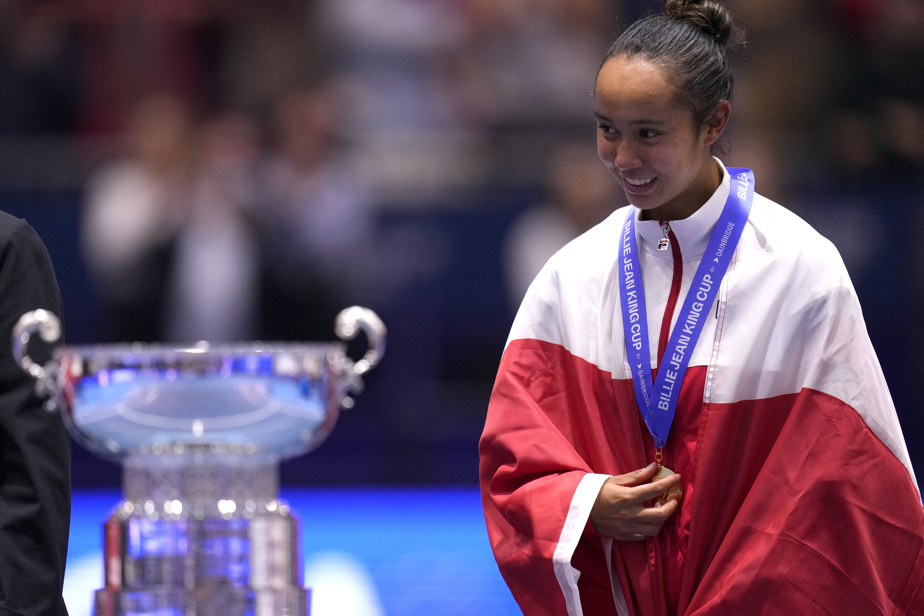When Leylah Annie Fernandez is asked to evaluate her season, she doesn’t even give herself a passing grade. It is even below 50%. And this, even if it allowed the Canadian team to become world champions.
What would her assessment have looked like if she hadn’t helped Canada win the first Billie Jean King Cup in its history? In a way, this victory saved his season.
“It’s not really the victory, it’s more the way I played,” says Fernandez, sitting at a table in the cafeteria of the IGA stadium.
The 21-year-old had just finished another training session at the National Center with her father Jorge and sister Bianca.
In reality, this triumph, or even her victory in Hong Kong, has very little impact on her assessment of her season. Instead, it focuses on improving your game in the broad sense by questioning your progress. To find out if she managed to become stronger physically, stronger mentally in difficult moments and more intelligent on the court.
She also focuses more and more on “not hitting the ball just to hit, but having a plan in your head before you hit.”
At the start of the season, she said, she “learned a lot about [herself].”
So much so that at the end of the year, “the results helped”. “But the way I played at the Billie Jean King Cup, that’s why I was able to raise my final rating,” she added in her sky blue sports tracksuit.
The Quebecer finished the 2022 season in 40th place and is 5 places ahead a year later, with a short rise to 32nd position during the season.
Despite having a record of 39 wins and 24 losses and a WTA 250 tournament title in her pocket, Fernandez was nuanced when asked how she defined the success of a season. Or at least, what were the criteria to be able to say whether or not a year had gone well.
“First, we look at the wins, because it’s anywhere on the internet,” she replied.
That being said, the evaluation is based on analyzing each of the matches on video.
“Do I see that I am stronger? Am I moving better? Are my decisions smarter? Do I make plays to finish points? »
It is therefore by lingering and answering all these questions that Fernandez manages to self-evaluate.
The keenest observers will certainly have noticed a clear difference in the performance and quality of Fernandez’s game between the first and second half of the season.
This change of direction took place following the full-time return of his father to the young player’s entourage, just before Wimbledon.
And she thus regained her feelings, and above all her confidence, from the start on the hard surface.
“He’s very organized and I love that. Very smart in how he prepares his practices and game plans,” Leylah says of her father Jorge.
From the Washington tournament at the end of July until the BJK Cup in November, Fernandez found herself more offensive and smarter in the way she managed her points.
“To get to the net and be able to finish volleys. I don’t win all the points, but every time I’m at the net, I’m a little more comfortable and I’m happy every time I can win important points from that place, because that’s where I was able to make the difference in the matches at the end of the year. »
She also briefly returned to her Montreal epic, where she once again won over her audience by reaching the third round. “I remembered why I started playing tennis. »
Starting at the National Bank Open, the left-hander managed to beat higher ranked players. Sporadically, we saw the finalist of the 2021 United States Open again. Beatriz Haddad Maia, Elise Mertens, Victoria Azarenka and Markéta Vondroušová are notably on her list.
In her head, it’s as if she had beaten Roger Federer every time. “For a long time, this has been our thing, our little secret, where every time he [Jorge] asks me who I play against, I always say Federer, because I know I want to play well and I want to win the game. »
Fernandez will return home to Florida in the coming days to enjoy the holiday season and especially to train outdoors.
Rigor and the desire to find her own faults drive the 21-year-old player more than ever. Looking back, she still finds a form of rejoicing through her pitfalls when she is able to admit that perfection is not a destination or an end goal, but rather an accumulation of the number of times she has played better than the day before.
“Especially finding the tiny details to be able to win the tournaments and to ultimately be able to win a Grand Slam. »
And the day she gets there, she will undoubtedly be able to give herself a passing grade.
